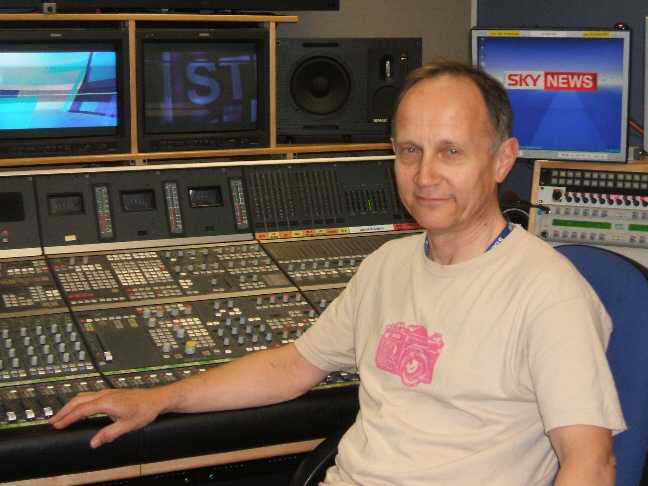
Viv Fisher is a Sound Operator in Studio Operations at Osterley, the West London studio centre of BSkyB, working on Sky News, Sky Sports, Five News, and occasional forays into Sky Arts and Movies.
Two anecdotes of Donald Sprinck
In his last decade Donald recorded a piano recital for sale on cassette in aid of a project at All Saints Church, Eastbourne. The master tape was analogue and it fell to me to ‘top and tail’ the various pieces, inserting blank tape between tracks and splicing the joints with adhesive tape. Also there was one edit: in the transcription by Tausig of Bach’s Toccata and Fugue. Donald had slightly fluffed an intricate passage in the high register and there had been a retake. The piece was the first we recorded, but I did not ask for the repetition until we had finished. I did not know what standard of accuracy Donald might be capable of producing and it would have been wrong to impose an Elysian standard from the outset, perhaps destabilizing the artist. Although Donald confessed subsequently that he always found recording stressful, the remainder of the pieces were played perfectly so I felt free to ask for the short section to be played again at the end of the two-hour session. Afterwards in the studio I duly inched the tape back and forth over the replay head, marking the in and out points of the original and of the retake with chinagraph pencil, and cutting out the two sections. It was advisable never to discard an original take until the edit had been proved to work (on occasion one had to restore the original and select an alternative edit point). So the two lengths of tape comprising the original and the retake briefly drooped side by side over the tape machine. As an extra check on my marking and cutting, I pulled them in parallel through my fingers to compare the lengths. I was astonished to find they matched exactly or, at least, any difference between them was of the same order as the width of the slim tape. I estimate the substituted piece to have lasted a little over twelve seconds. The recording tape ran at fifteen inches per second and its width was one quarter of an inch. This suggests that at the end of a two hour recording session including a wide variety of styles and a vast range of tempi, Donald was capable of re-setting his inner metronome for the Bach piece with an accuracy of one part in 720.
Soon after learning to sing Donald’s “Cantate Domino” I went to make recordings at the Keswick Convention. The music must have remained barely out of my consciousness, for a Lakeland vista brought it to mind very readily. On a free afternoon I had climbed the small hill “Latrigg” from the East. The views are relatively modest on this route, but the reward is the sudden appearance of the town at one’s feet, Derwent Water with Borrowdale to the left, the glorious cluster of Western Fells stretching ahead and Bassenthwaite Lake to the right. Donald’s music provided the spontaneous soundtrack for this moment; it entered my mind from I know not where and it accompanied my joyful descent. Returned to Eastbourne I recounted the episode to Donald who listened attentively but with none of the appreciation I might have anticipated. I enthused over the sudden appearance of the scene, how wonderfully the music had enhanced the revelation, but it was evident that Donald was uncomprehending. When I had finished, Donald stared at me for a few seconds and then simply remarked, “How odd”. This was no dismissive put-down; it was apparent he considered it unfeasible that any music of his might have been comparable with great works of nature, or capable of enhancing such a moment. I had been prepared for expressions of modesty but I believe what I found was an unconscious and unaffected humility.